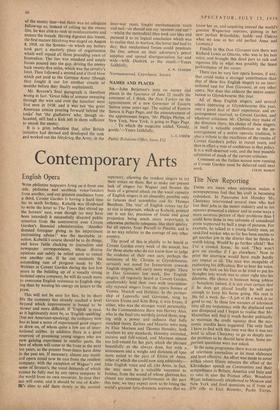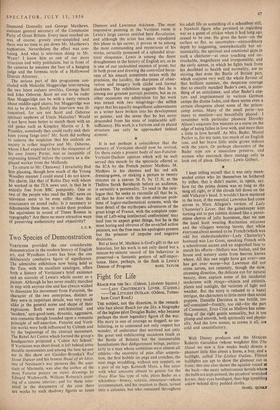The New Reporting
THERE arc times when television makes a newspaperman feel that his craft is becoming redundant. In Panorama last Monday Mr, Chataway interviewed several men who had lost their jobs in the motor industry and in ten minutes presented a clearer and in some ways a more accurate picture of their problems than I could have done in two columns of considered prose supported by half a page of pictures. For example, he talked to a young family man, an unskilled worker who so far has been unable to get another job in the district that he thinks is worth taking. Would he go further afield? 'But I've a council house,' he said. 'They won't give me another if I go elsewhere.' Now in print the interview would have made hardly any impact at all. The man was incapable of explaining his difficulties. But to hear his voice, to see the lOok on his face as he tried to put his thoughts into words was to enter right into his dilemma. His ehoice is between being jobless or homeless; indeed, it is not even certain that if he does get placed locally he will earn enough to keep his home going. His rent is 38s. 6d. a week. So—`A job at a a week,is no good to me.' In these few minutes of television time all my impatience with the displaced men was dissipated and I began to realise that Mr. Macmillan will find it much harder politically to maintain the credit squeeze than the eco- nomic pundits have suggested. The only fault I have to find with this item was that it was too brief to allow Chataway to go as deeply into the problem as he should have done. Some im- portant questions were not asked.
In the same programme there was an example of television journalism at its most elaborate and least effective. An effort was made to cover within about fifteen minutes the effect of the Khrushchev speech on Communists and their sympathisers in Britain, America and Italy and to take in also the Poznan affair. Woodrow Wyatt industriously telephoned to Moscow and New York and fired questions as if from an FN rifle at Earl Browder, Paolo Treves, Desmond Donnelly and George Matthews, assistant general secretary of the Communist Party of Great Britain. Every issue touched on Was, of course, grossly over-simplified and there was no time to pin down Mr. Matthews's sophistries. Nevertheless the effect was con- fusing. And what is television doing to Mr. Wyatt? I know him as one of our more vivacious and witty politicians, but in front of the cameras he assumes the face of a hanging Judge and the forensic style of a Hollywood District Attorney.
The serious part of this programme con- cluded with Malcolm Muggeridge interviewing the two latest enfants terribles, George Scott and John Osborne. Scott set out to be ruder than Muggeridge can be with a nasty remark about middle-aged ulcers; but Muggeridge was not to be drawn. Surely the interview was ill- conceived, for are not Scott and Osborne Spiritual nephews of Uncle Malcolm? Would It not have been better to match them with an old pinko such as Kingsley Martin or J. B. Priestley, somebody they could really sink their keen young fangs into? Mr. Scott did nothing to remove the suspicion that his outlook on society is rather negative and Mr. Osborne, Whom I had expected to have the eloquence of his own Jimmy Porter, was as incapable of expressing himself before the camera as a dis- placed worker from the Midlands.
To return to Mr. Chataway. I invariably find him pleasing, though how much of the Young Woodley manner I could stand I do not know. His charm, like that of Robin Day with whom he worked in the ITA news unit, is that he is entirely free from BBC pomposity. One or two of the people who read the BBC news on television seem to be even stiffer than the announcers on sound radio. Is it necessary to dehumanise these men, to make them produce the equivalent in sound of Times Roman in typography? Are there no more attractive ways of preserving authenticity and objectivity?
J. C. B.



































 Previous page
Previous page